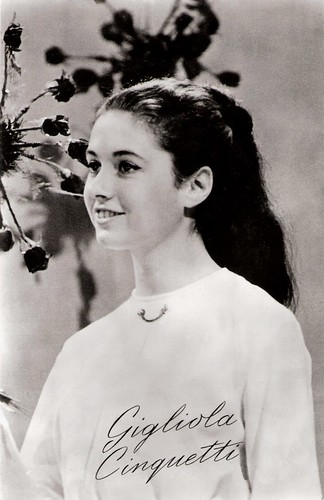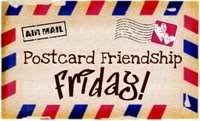EFSP salutes the European Song Contest! Even down under, in Australia, they know it's a fabulous event. Tomorrow night the finals of the 60th Eurovision Song Contest take place in Stockholm, Sweden. EFSP presents postcards of twelve dazzling participants of the past.
![Lys Assia]()
The winner of the very first Eurovision Song Contest in 1956 was Swiss singer and actress Lys Assia (1924).
German card by Telefunken Schallplatten. Photo: Teldec/Haenchen.
![André Claveau]()
From the 1940s to the 1960s, André Claveau (1911–2003) was a popular singer and film actor in France. He won the 1958 Eurovision Song Contest with Dors, mon amour (Sleep, My Love).
French postcard by O.P, Paris, no. 117. Photo: Le Studio.
![Teddy Scholten]()
The winner of the Eurovision Song Contest 1959 was Dutch singer Teddy Scholten (1926-2010).
Dutch postcard by Uitg. Takken, Utrecht, no. 4000. Photo: 't Sticht, Utrecht.
![Gigliola Cinquetti]()
At the age of 16, Italian singer Gigliola Cinquetti (1947) won Festival di Sanremo with Non ho l'età and with the same song she won the Eurovision Song Contest 1964 and scored her first international hit.
Dutch postcard by Takken, Utrecht, no. AX 5908.
![Udo Jürgens (1934-2014)]()
Udo Jürgens (1934-2014) was one of the biggest stars and entertainers in the German speaking countries. In 1966, he was the first Austrian winner of the Eurovision Song Contest with Merci, Chérie.
German postcard by Filmbilder-Vertrieb Ernst Freihoff, Essen, no. AX 7081. Photo: Ariola.
![Sandie Shaw]()
British singer Sandie Shaw (1947) was 'the barefoot pop princess of the 1960s' after she had won the Eurovision Song Contest in 1967. She was the first UK act to win!
Italian postcard. Photo: Voce del Padrone.
![Massiel]()
Spanish pop singer Massiel (1947) won the Eurovision Song Contest 1968 with the song La, la, la, beating Cliff Richard's Congratulations. Spanish postcard by Postal Oscar Color S.A., Barcelona, no. 782. Photo: H. Segui.
![Mary Hopkin]()
Welsh folk singer Mary Hopkin (1950) is best known for her 1968 UK number one single Those Were The Days, produced by Paul McCartney. She represented the United Kingdom in the 1970 Eurovision Song Contest singing Knock, Knock Who's There?. Hopkin came second to All Kinds of Everything, performed by Irish singer Dana.
British postcard by Valentine's Postcard Communication.
![Hearts of Soul]()
Hearts of Soul was formed by three Dutch Indo sisters: Bianca, Stella and Patricia Maessen (1952-1996). In 1970, they sung Waterman as the entry of the Netherlands at the Eurovision Song Contest. They ended seventh. Dutch promotion card by Basart Records International, Amsterdam. Photo: Wim Heiblom. The Hearts of Soul were dressed by Shubette of London.
![Vicky Leandros]()
Vicky Leandros (1949) is a Greek singer with a long international career. In 1972, she achieved worldwide fame after winning the Eurovision Song Contest with the song, Après Toi, while representing Luxembourg.
Big East-German card by VEB Lied der Zeit Musikverlag, Berlin, 1980. Photo: Hartmut Schorsch, Berlin.
![ABBA]()
ABBA were the winners at the Eurovision Song Contest in 1974, giving Sweden its first victory in the history of the contest and being the most successful group ever to take part in the tournament. Swedish postcard by Ultraförlaget A.B., Stockholm, no. 28 - 012. Photo: Torbjörn Calvero.
![Baccara]()
Baccara was a female vocal duo formed in 1977 by Spanish artists Mayte Mateos (1951) and María Mendiola (1952). The pair rapidly achieved international success with their debut single Yes Sir, I Can Boogie, which reached number one across much of Europe. In 1978 the duo represented Luxembourg at the Eurovision Song Contest. They finished seventh with Parlez vous Français?
German promotion card. Photo: RCA.
This is a post for Postcard Friendship Friday, hosted by Beth at the The Best Hearts are Crunchy. You can visit her by clicking on the button below.
![]()

The winner of the very first Eurovision Song Contest in 1956 was Swiss singer and actress Lys Assia (1924).
German card by Telefunken Schallplatten. Photo: Teldec/Haenchen.

From the 1940s to the 1960s, André Claveau (1911–2003) was a popular singer and film actor in France. He won the 1958 Eurovision Song Contest with Dors, mon amour (Sleep, My Love).
French postcard by O.P, Paris, no. 117. Photo: Le Studio.

The winner of the Eurovision Song Contest 1959 was Dutch singer Teddy Scholten (1926-2010).
Dutch postcard by Uitg. Takken, Utrecht, no. 4000. Photo: 't Sticht, Utrecht.

At the age of 16, Italian singer Gigliola Cinquetti (1947) won Festival di Sanremo with Non ho l'età and with the same song she won the Eurovision Song Contest 1964 and scored her first international hit.
Dutch postcard by Takken, Utrecht, no. AX 5908.

Udo Jürgens (1934-2014) was one of the biggest stars and entertainers in the German speaking countries. In 1966, he was the first Austrian winner of the Eurovision Song Contest with Merci, Chérie.
German postcard by Filmbilder-Vertrieb Ernst Freihoff, Essen, no. AX 7081. Photo: Ariola.

British singer Sandie Shaw (1947) was 'the barefoot pop princess of the 1960s' after she had won the Eurovision Song Contest in 1967. She was the first UK act to win!
Italian postcard. Photo: Voce del Padrone.

Spanish pop singer Massiel (1947) won the Eurovision Song Contest 1968 with the song La, la, la, beating Cliff Richard's Congratulations. Spanish postcard by Postal Oscar Color S.A., Barcelona, no. 782. Photo: H. Segui.

Welsh folk singer Mary Hopkin (1950) is best known for her 1968 UK number one single Those Were The Days, produced by Paul McCartney. She represented the United Kingdom in the 1970 Eurovision Song Contest singing Knock, Knock Who's There?. Hopkin came second to All Kinds of Everything, performed by Irish singer Dana.
British postcard by Valentine's Postcard Communication.

Hearts of Soul was formed by three Dutch Indo sisters: Bianca, Stella and Patricia Maessen (1952-1996). In 1970, they sung Waterman as the entry of the Netherlands at the Eurovision Song Contest. They ended seventh. Dutch promotion card by Basart Records International, Amsterdam. Photo: Wim Heiblom. The Hearts of Soul were dressed by Shubette of London.

Vicky Leandros (1949) is a Greek singer with a long international career. In 1972, she achieved worldwide fame after winning the Eurovision Song Contest with the song, Après Toi, while representing Luxembourg.
Big East-German card by VEB Lied der Zeit Musikverlag, Berlin, 1980. Photo: Hartmut Schorsch, Berlin.

ABBA were the winners at the Eurovision Song Contest in 1974, giving Sweden its first victory in the history of the contest and being the most successful group ever to take part in the tournament. Swedish postcard by Ultraförlaget A.B., Stockholm, no. 28 - 012. Photo: Torbjörn Calvero.

Baccara was a female vocal duo formed in 1977 by Spanish artists Mayte Mateos (1951) and María Mendiola (1952). The pair rapidly achieved international success with their debut single Yes Sir, I Can Boogie, which reached number one across much of Europe. In 1978 the duo represented Luxembourg at the Eurovision Song Contest. They finished seventh with Parlez vous Français?
German promotion card. Photo: RCA.
This is a post for Postcard Friendship Friday, hosted by Beth at the The Best Hearts are Crunchy. You can visit her by clicking on the button below.
